
We have established with both scriptural and logical support that Christ the King has appointed men to both have and exercise a royal authority within this kingdom. And as are nearly all things in the Old Testament, we see a fulfillment of these things in the New, including the Kingdom. Christ the King is the fulfillment of the Old Testament kings, but what about the king’s “prime minister” about whom we read in Isaiah?
Isaiah 22:20-25: “In that day I will call my servant Eliakim the son of Hilkiah, and I will clothe him with your robe, and will bind your belt on him, and will commit your authority to his hand; and he shall be a father to the inhabitants of Jerusalem and to the house of Judah. And I will place on his shoulder the key of the house of David; he shall open, and none shall shut; and he shall shut, and none shall open. And I will fasten him like a peg in a sure place, and he will become a throne of honor to his father’s house. And they will hang on him the whole weight of his father’s house, the offspring and issue, every small vessel, from the sups to all the flagons. In that day, says the Lord of hosts, the peg that was fastened in a sure place will give way; and it will be cut down and fall, and the burden that was upon it will be cut off, for the Lord has spoken.”
In this passage, God, through Isaiah His prophet announces to Shebna, the acting prime minister of the kingdom, that he will be replaced with Eliakim. The imagery used here to describe this passing down of authority through the abdicating and subsequent filling of the royal office is of utmost importance. Notice particularly the image of the key of the house of David, that is, the kingdom. It is significant because it signifies the authority of the king.
When considering the meaning of any symbol, a number of elements must be taken into account but most especially the practical use of the object that is doing the symbolizing. In this instance, a key is used to unlock a door for the purposing of entering a particular edifice. Upon entrance, by virtue of the possession of this key, one now has access to and consequently the use of everything belonging to the master of the house. Symbolically, the passing down of the key of a kingdom logically represents both access to and use of the prerogatives of the king himself. This is evident by its use in Isaiah. The context is clear. And the phrase, “he shall open and none shall shut; and he shall shut and none shall open” simply expresses the fact that whatever he does cannot be undone by anyone. His declarations are binding on those under his authority.
How do we make sense of this in light of the New Kingdom established by Christ? If the New Kingdom is somehow the fulfillment of the Old, did Jesus the true King ever pass down His own authority in the same manner? The answer is found in Matthew’s Gospel.
Matthew 16: 13-20: “Now when Jesus came into the district of Caesarea Philippi, he asked his disciples, ‘Who do men say that the Son of man is?’ And they said, ‘Some say John the Baptist, others say Elijah, and others Jeremiah or one of the prophets.’ He said to them, ‘But who do you say that I am?’ Simon Peter replied, ‘You are the Christ, the Son of the living God.’ And Jesus answered him, ‘Blessed are you, Simon Bar-Jonah! For flesh and blood has not revealed this to you, but my Father who is in heaven. And I tell you, you are Peter, and on this rock I will build my church, and the powers of death shall not prevail against it. I will give you the keys of the kingdom of heaven, and whatever you bind on earth shall be bound in heaven, and whatever you loose on earth shall be loosed in heaven.’”
This is the key to understanding the key! Jesus Christ our King has passed down the key to the kingdom of heaven, His own authority, to the prime minister of His Kingdom. As a prime minister, Peter is simply filling an office, and as this office is a necessary part of His Kingdom, it will never pass away. Practically speaking, what is the function of this office? As our Lord tells Peter, he now has the authority of binding and loosing which is rabbinical terminology for exercising a teaching authority, a teaching authority that, in this case, cannot be overridden by anyone else, for it will be ratified in Heaven by the King Himself, bringing to light the corresponding phrase in Isaiah, “he shall open and none shall shut; and he shall shut and none shall open.”
Is this the extent of Peter’s new responsibility? Apparently not, for the Good Shepherd sees fit to further expound on this at a later time. John 21:16-17 recounts Jesus’ words to his new prime minister: “Feed my lambs”, Feed my lambs”, “Feed my sheep”. Not only must Peter teach, but he must also be a pastor, a shepherd. What’s striking is that in John 10, Jesus identifies Himself as the Good Shepherd, but John 21 reveals to us Peter as the new shepherd. Peter has become Christ’s representative on earth as both a teacher and a pastor making available to us both truth and life.
Another question should be asked with reference to Peter as the new shepherd. Is it reasonable to assume that when Jesus referred to His lambs and His sheep in John 21, that He was referring only to those who were alive at that moment in time living in that particular area? Of course not, for his lambs and sheep include all who believe in Him at all times and in all nations, bringing us back to what it means to be Catholic. The only way Peter could possibly feed all sheep at all times and in all nations is if his office was to be filled upon his leaving that office. Thus we get the successors of Peter, the popes, Jesus’ prime ministers.
So what is Jesus’ Kingdom but the Catholic Church?
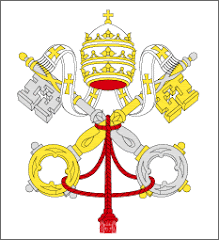
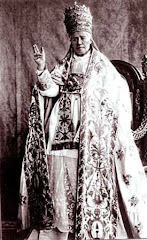
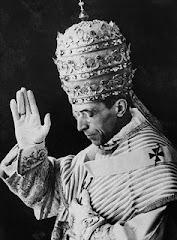

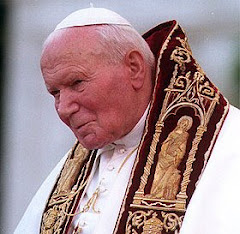
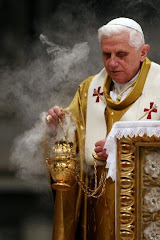













1 comment:
Very good stuff, my friend. I can see your writings will be great a great resource for all of us. Keep it up.
Post a Comment